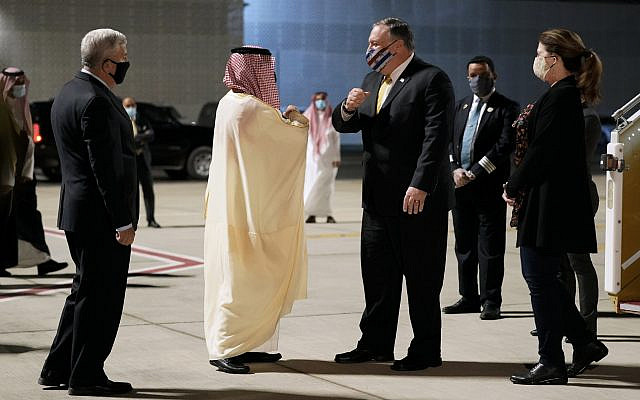 The long path to Israeli-Saudi normalization
The long path to Israeli-Saudi normalization
Kenneth Jacobson
Considering Saudi importance in the Arab world and the nation’s centrality in standing up for the Palestinians, even the possibility of ties with Israel is a radical shift indeed
 US Ambassador to Saudi Arabia John Abizaid, left, and Saudi Arabia’s Foreign Minister Faisal bin Farhan, second from left, greet Secretary of State Mike Pompeo and his wife Susan as they arrive at Neom Bay Airport in Neom, Saudi Arabia, November 22, 2020. (AP Photo/Patrick Semansky, Pool)
US Ambassador to Saudi Arabia John Abizaid, left, and Saudi Arabia’s Foreign Minister Faisal bin Farhan, second from left, greet Secretary of State Mike Pompeo and his wife Susan as they arrive at Neom Bay Airport in Neom, Saudi Arabia, November 22, 2020. (AP Photo/Patrick Semansky, Pool)
Even if Prime Minister Benjamin Netanyahu’s secret visit to Saudi Arabia with Secretary of State Mike Pompeo does not lead in the short-term to official Israeli-Saudi relations, it is impossible to minimize the historic significance of such an event.
From Israel’s founding, Saudi Arabia has represented the fundamental Arab worldview of Israel as a pariah state. You name the anti-Israel campaign — the Arab economic boycott, disallowing Israel to participate in international events, anti-Semitic rhetoric at the United Nations — and the Saudis were often at the top of the list. And in religious terms, with Saudi Arabia the site of the holiest place in Islam, Mecca, its edicts about a non-Islamic state in the heart of the Muslim Middle East had additional power.
And, of course, when Saudi Arabia did these things, with the influence of its immense oil wealth, it sent a signal to other Arab countries as well as the rest of the world, that in its mind, Israel was not only not illegitimate, but not here to stay.
And yet, like most breakthroughs in patterns of relations, it also didn’t happen overnight. In this regard, one has to go back to the Saudi Arab Peace Initiative of 2002, where the kingdom took a significant step away from the unbroken line that the Jewish state was a fundamentally illegitimate entity in the Muslim Middle East.
The plan may have been seen by some Israelis as a non-starter because of its specific demands about territory, refugees, and Jerusalem. However, from a long-term historical perspective, it is clear that the ideological objection even to consider the legitimacy of a Zionist presence in the region had taken a beating. The language of the plan was clear: if Israel would agree to its terms, there would be normalized relations with the Jewish state.
This occurred before the arrival on the scene of the Crown Prince Mohammed bin Salman (known as MBS), whose aspirations for a modern Saudi Arabia are viewed as central to a host of changes in the kingdom, including the attitude toward Israel. And it occurred prior to the full-blown explosion of fears among the Gulf states of Iranian expansionism in the region.
As has been repeatedly noted, what has been most significant about the UAE, Bahrain and Sudan breakthroughs is that they took place even without any progress on the Palestinian issue. In many circles, that was deemed an impossibility. And, as analysis emerges on the Netanyahu visit, the question is whether the Saudis would be ready to go that way as well, considering their importance in the Arab world and their centrality in standing up for the Palestinians.
And while the Saudi Arab Peace Plan of 2002 represented the most official expression of the idea that change toward Israel depended on resolution of the Palestinian problem, the more interesting historical development as seen from the current process of normalization is how it had come to pass already, then, that normalization was even being considered.
In that regard, one must return to basics which first manifested themselves in the still most historic breakthrough in the Middle East, the 1979 Egyptian peace agreement with Israel.
While it is easy to cite all the differences that that deal embodied, the factors that made this Israel-Egypt peace possible — and which overturned so many assumptions about Israel’s place in the region — should be recalled.
First and foremost, it was Israel’s military strength. After the Six Day War and then the Yom Kippur war, it was clear to Anwar Sadat that Israel was too powerful militarily to believe there was any hope of eliminating it from the Middle East.
Secondly, there was American support for the Jewish state, not only diplomatically but economically, militarily, and most significantly, culturally. It wasn’t going to change and therefore Israel’s strength was not going to dissipate.
Thirdly, there was the realization that focusing on Israel as the enemy diverted attention from the true needs of Egyptian society and, in any case, was fruitless in that its desired goal of Israel’s disappearance was an illusion.
While Egypt’s peace with Israel did not immediately spread through the region, these factors over time could not be ignored by other states.
In sum, the long-term recognition of Israeli realities together with the more immediate concern about the Iranian threat have all come together in the present exciting developments.
It is too early to predict where the reported Netanyahu-MBS meeting will lead. What is clear, however, even as certain elements elevate efforts to try to delegitimize the Jewish state, is that Israel’s legitimacy in the Middle East is more secure than ever and is growing by leaps and bounds every day.
Zawartość publikowanych artykułów i materiałów nie reprezentuje poglądów ani opinii Reunion’68,
ani też webmastera Blogu Reunion’68, chyba ze jest to wyraźnie zaznaczone.
Twoje uwagi, linki, własne artykuły lub wiadomości prześlij na adres:
webmaster@reunion68.com
